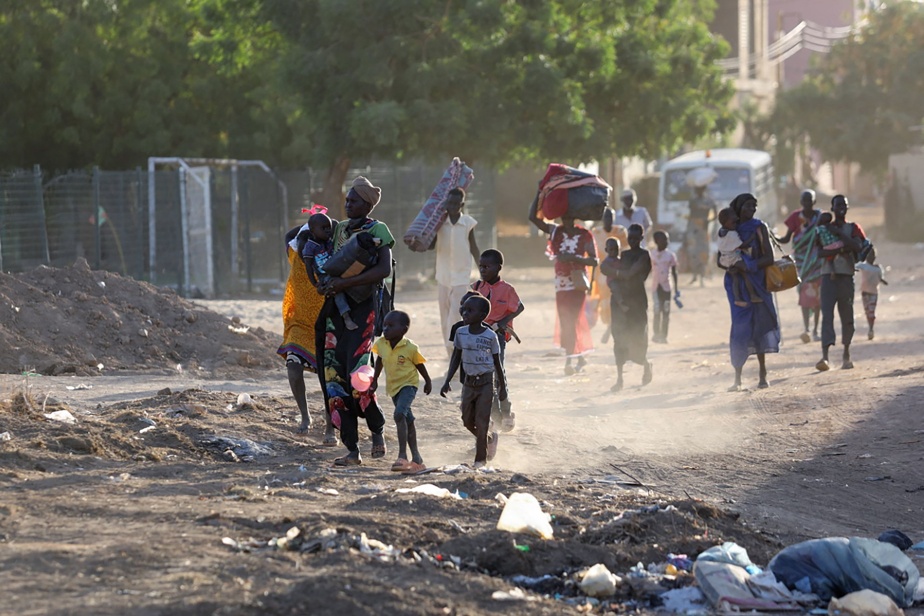(Khartoum, Sudan) Five days after the start of the clashes, the inhabitants of Khartoum are packing their bags. Many are trying to reach areas spared by this conflict which has claimed nearly 300 victims.
“We’ll leave the town to you!” “, quips a young man dressed in a purple t-shirt for the military and militiamen. Like him, many Sudanese are dismissing the head of the army, Abdel Fattah al-Burhane, and that of the paramilitary militia of the Rapid Support Forces (RSF), General Mohamed Hamdan Dagalo, known as “Hemeti”, back to back.
Until then allies of convenience, these two warlords have been clashing since April 15 in various places in Sudan. The capital has become the epicenter of this conflict which has left at least 296 dead and 3,019 injured. Taking advantage of a brief lull, hundreds of residents headed for the bus station on the fifth day of clashes.
A leaden silence haunts Street 60, this great artery in the east of Khartoum, which the boy in the purple t-shirt was crossing. Garbage accumulates on the central reservations. The temperature is close to 40°C. The lucky ones, equipped with both a car and a full tank, pile up their belongings in the trunk.
“Today it seems a little calmer, so we are leaving,” comments a father in the middle of a move. We won’t be back until the war is over for good. He is about to reach a village in the state of al-Jazirah, south of Khartoum.
Abdalla Mahjoub, his parents, his sister and his two brothers made the same journey the day before. “We were ready before sunrise. Suddenly, very powerful bombardments sounded. We still left by car, being very careful, says this dentist. On 60 Street, many families were walking towards the station. The saddest thing is that they traveled several kilometers, when there were only two buses on arrival. »
Abdalla Mahjoub left his home after a bullet, fired by a militiaman, landed on his balcony. Often very young and transferred from Darfur a few weeks before the start of hostilities, the RSF terrorize the population. “They bomb randomly,” says Momen Osama. This student saw no less than nine dead bodies on April 19, in an area that seems to be under paramilitary control. His discovery of the afternoon deeply upset him.
In Bahri, a town separated from Khartoum by the Blue Nile, Amira Abdelgader also plans to turn her back on the fighting. “I don’t understand why the two generals don’t want to let us go”, indignant, between two sobs, this single mother of a 6-year-old girl and a 5-year-old boy. A few minutes earlier, militiamen entered his building. However, adds this professor of mathematics, the RSF are famous for stealing everything they find and raping women.
Mina Abdelkarim lives in a residential area, far from the strategic points of the capital. However, she received a shard of mortar on Wednesday. The biomedical engineer escaped with a superficial burn to her abdomen. Not enough to convince this member of a resistance committee, one of these active pro-democracy antennas throughout the territory, to go into exile.
“We have reopened a first aid clinic for the injured who cannot reach the hospital because traveling is dangerous. We are all volunteers, explains the young woman. We’re short on arms, so I can’t go and leave everyone behind. »
In the state of al-Jazirah too, solidarity is being organized. Local residents open their doors to both loved ones and strangers. Mohamed Maharugi published an announcement on social media on Tuesday evening to offer the 50 beds in his dormitory for female students, empty on the eve of Eid. It no longer counts the calls received since. “The situation looks terrible. I pray to God to help the people of Sudan,” the philanthropist said. Devoid of paramilitary troops, the town of Wad Madani, where Mohamed Maharugi is located, is calm. He knows, however, that the conflict will eventually catch up with him.
“At the moment, we lack nothing. In a few days, however, basic necessities will be lacking. Because many people will keep coming, but mostly because the businesses that the whole country depends on are located in Khartoum,” he warns.
Certain districts of the capital have been plunged into darkness for several days. While the few grocery stores that open their doors are almost out of food. Not far from Street 60, the one the young man in the purple t-shirt was walking up, a septuagenarian whispers: “I was born in Khartoum and I’ve never seen anything like it. »

